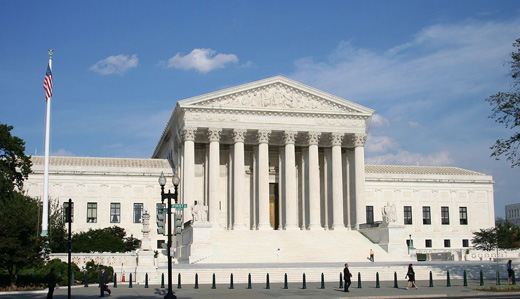
WASHINGTON (PAI)-In a win for unions, public workers and whistleblowers, the U.S. Supreme Court unanimously backed an Alabama whistleblower whom his boss illegally fired for testifying about fraud to a grand jury and a trial jury.
The 9-0 ruling cheered the National Education Association (NEA), whose Alabama affiliate – the largest and most-influential union in the state – provided the attorneys for whistleblower Edward Lane in lower court arguments.
NEA and other unions also filed friend-of-the-court briefs for Lane with the justices, arguing for wide protection of public worker whistleblowers in virtually all cases. But Justice Sonia Sotomayor, speaking for the court, didn’t go that far.
“Almost 50 years ago, this court declared citizens do not surrender their 1st Amendment rights” of free speech “by accepting public employment,” she wrote.
“Rather, the 1st Amendment protection of a public employee’s speech depends on a careful balance ‘between the interests of the employee, as a citizen, in commenting upon matters of public concern and the interest of the state, as an employer, in promoting the efficiency of the public services it performs through its employees.'”
In 1968, she added, the justices extended constitutional protection “to a teacher who was fired after writing a letter to the editor of a local newspaper criticizing the school board that employed him. Today, we consider whether the 1st Amendment similarly protects a public employee who provided truthful sworn testimony, compelled by subpoena, outside the course of his ordinary job responsibilities. We hold that it does.”
Lane had testified before a grand jury and later at trials of a state legislator who got a no-show job at a publicly funded job-training program for disadvantaged youth. The lawmaker was convicted of fraud. The community college Lane worked for helped run the program.
Lane’s supervisor, the community college president, decided the program needed to cut staff to save money. He fired 29 people – and then immediately rehired 27 of them after finding they hadn’t been on probation, as he thought. He didn’t rehire Lane, who sued, alleging retaliation. The lower courts agreed with the supervisor, but the justices backed Lane.
“Speech by citizens on matters of public concern lies at the heart of the 1st Amendment, which was fashioned to assure unfettered interchange of ideas for the bringing about of political and social changes desired by the people,” Sotomayor said.
“This remains true when speech concerns information related to or learned through public employment. After all, public employees do not renounce their citizenship when they accept employment, and this court has cautioned time and again that public employers may not condition employment on the relinquishment of constitutional rights.”
Using language similar to that unions filed in their pro-Lane briefs, Sotomayor added, “there is considerable value, in encouraging, rather than inhibiting, speech by public employees. Government employees are often in the best position to know what ails the agencies for which they work. The interest at stake is as much the public’s interest in receiving informed opinion as it is the employee’s own right to disseminate it.”
But she added the employer – schools, the states, or local government – still could have some very limited instances where its control of the workplace overrides the individual worker’s free speech rights.
NEA President Dennis Van Roekel cheered the court’s ruling, but said the justices should have extended it to every instance where a public worker speaks out.
“The Supreme Court took an important step in ensuring the free speech rights of public employees by concluding Edward Lane’s testimony was speech as a citizen on a matter of public concern,” Van Roekel said. “We are pleased the court recognized public employees are indeed protected by the 1st Amendment when they testify. Today’s decision will protect public employees from job retaliation when they testify in court about public corruption.
“We are disappointed the court did not go further to establish a clear rule that sworn testimony by public employees should never be the basis for any retaliatory action by a public employer. The decision was too narrow. Public employees who have the courage to stand up and speak out to improve public services and prevent corruption should be protected from retaliation,” he said.
Teachers often must speak out to protect their students and advocate for resources for them, Van Roekel said. And when they do so, the teachers should be protected, too.












Comments